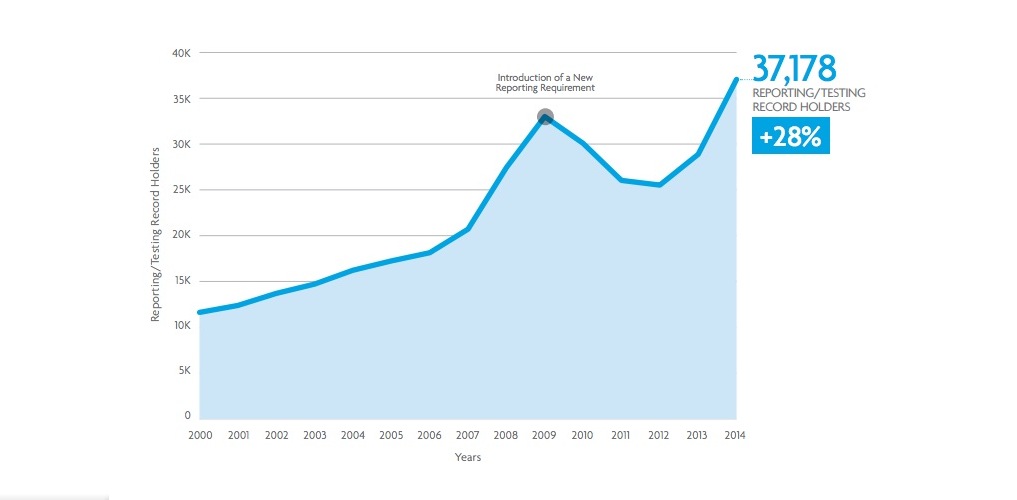The National Council of Architectural Registration Boards (NCARB) released the 2015 edition of NCARB by the Numbers, a yearly report about the path to licensure. The redesigned publication is available for free download at www.ncarb.org/NBTN.
The latest NCARB data reveals a number of positive trends relating to both the future of the architectural community and NCARB’s regulatory and licensing efforts.
“The architect profession is healthy and growing,” said NCARB CEO Michael Armstrong. “The report’s findings also help validate the efforts of NCARB and its licensing board members to open doors of opportunity for qualified people in the architecture profession without sacrificing the rigor needed to ensure public health, safety, and welfare.”
The report’s findings indicate progress in several key areas:
• A record high of 37,178 aspiring architects either reporting hours through the Intern Development Program (IDP) or testing for the Architect Registration Examination (ARE).
• 107,581 licensed architects reported by the 54 U.S. licensing boards, a 3% increase since 2011.
• The average age of an architect upon initial licensure fell to 33.3 in 2014, shaving off 2.7 years since 2008.
• Racial and ethnic minorities made up 41% of the aspiring architect talent pool in 2014, compared to 22% in 2007.
• Women made up 38% of aspiring architects who completed the IDP in 2014, compared to 25% in 2000.
• Women also accounted for 35% of candidates who completed the ARE last year, a percentage that has nearly doubled since 2000.
Program changes, as well as NCARB’s renewed focus on providing guidance and clear communications to emerging professionals, have played a big part in improved performance metrics, said NCARB 2014-15 President Dale McKinney, FAIA, NCARB. “NCARB’s 2014 data finds that the growing number of female aspiring architects, combined with those from racial and ethnic minority groups, indicates the future architect workforce should be more diverse.”
Download the full report at: www.ncarb.org/NBTN
Related Stories
| May 13, 2014
19 industry groups team to promote resilient planning and building materials
The industry associations, with more than 700,000 members generating almost $1 trillion in GDP, have issued a joint statement on resilience, pushing design and building solutions for disaster mitigation.
| May 13, 2014
Libeskind wins competition to design Canadian National Holocaust Monument
A design team featuring Daniel Libeskind and Gail Dexter-Lord has won a competition with its design for the Canadian National Holocaust Monument in Toronto. The monument is set to open in the autumn of 2015.
| May 12, 2014
Defining BIM – What do owners really want?
Given the complexities of the building process, it can be difficult for building owners to effectively communicate what they want and need with BIM. The response to the question usually is, “Give me everything.”
| May 12, 2014
The best of affordable housing: 4 projects honored with 2014 AIA/HUD Secretary Awards [slideshow]
The winners include two dramatic conversions of historic YMCA buildings into modern, affordable multifamily complexes.
| May 11, 2014
8 starter questions to answer when thinking about building
So, are you ready to start building? Completing these eight questions will help you answer that confidently. SPONSORED CONTENT
| May 11, 2014
Final call for entries: 2014 Giants 300 survey
BD+C's 2014 Giants 300 survey forms are due Wednesday, May 21. Survey results will be published in our July 2014 issue. The annual Giants 300 Report ranks the top AEC firms in commercial construction, by revenue.
| May 10, 2014
How your firm can gain an edge on university projects
Top administrators from five major universities describe how they are optimizing value on capital expenditures, financing, and design trends—and how their AEC partners can better serve them and other academic clients.
| May 9, 2014
It's official: Norman Foster-designed Harmon hotel and casino to be razed due to structural issues
Construction of the Las Vegas tower was halted in 2008 after experts discovered faulty steel beams in the structure. Now its owner, MGM, has received permission to demolish the building.
| May 9, 2014
5 trends transforming higher education
Performance-based funding models and the adoption of advanced technologies like augmented reality for teaching are just a few of the predictions offered by CannonDesign's higher education sector leader, Brad Lukanic.
| May 9, 2014
40 Under 40: Where are they now?
BD+C catches up with two past U40 honorees: Matt Dumich of Adrian Smith + Gordon Gill Architecture and David Montalba of Montalba Architects

















